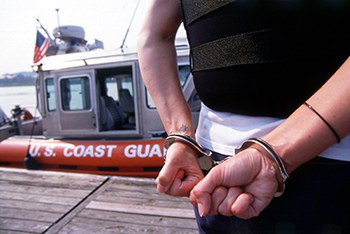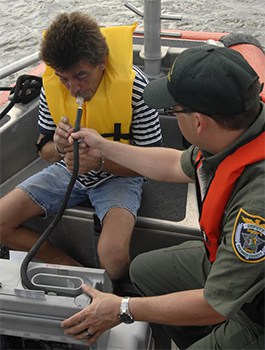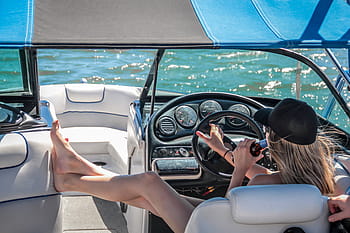There seems to be a common misconception about drinking and boating. Don’t listen to rumors that there are no laws regarding alcoholic beverages for boaters. You just may end up in behind bars (not the bars where you meet your buddies or pick up women).
Boats are allowed to have open alcohol containers on board here in the United States. Passengers on a boat are allowed to consume alcohol, however it is illegal for the boat operator to have a .08 blood/alcohol level or higher.
If you’re located in Canada, the laws on alcohol are very different for boats. They are much closer to that of motor vehicles for roadways. While each state in the U.S. may have slight variations in their boating laws, it’s always best to know exactly what you can, and can not do when it comes to open container and alcohol consumption.
Who Can Have An Open Container On A Boat
Generally speaking, any passenger on your boat over the age of 21 is allowed to have an open container of alcohol. In many states it is also legal for the boat operator to possess an open container, but it is illegal to operate a boat under the influence of alcohol with a .08 or higher.
 In most of the states, operating a boat with a BAC (Blood Alcohol Content) of .08 or higher is illegal. Boating under the influence (BUI) is a serious offence and can affect your driving record and land you in jail.
In most of the states, operating a boat with a BAC (Blood Alcohol Content) of .08 or higher is illegal. Boating under the influence (BUI) is a serious offence and can affect your driving record and land you in jail.
For instance in New Jersey, if you get cited with a BUI, you will have your boating AND driving privileges suspended. If you plan on consuming any alcoholic beverages, you may want to eat some food and plan on staying at anchor for a while to sober up.
Again, you are totally fine to have an open container of alcohol as the boat’s operator if you are for sure under a .08 BAC. The problem is, people tolerate alcohol differently, but a BAC number registers the same for everyone, so how do you know for sure? The boat operator could sustain from drinking alcohol to keep everyone safe.
Don’t think you can feel when you’re close to your BAC limit. Many things affect how you feel the effects of alcohol, so it may be sunny, overcast, hot , cold, rainy, etc. and you may feel different in each scenario.
The safest way to deal with having an open container as the boat’s operator, is to not drink and drive a boat in the first place. The reason is because there are no traffic lights, driving lanes, or braking systems in boating.
This requires a boat operator to need better skills and more advance awareness. You also need to remember that in the case of an accident on the water, it takes far longer to reach a hospital than it does if the accident took place on the roadway.
Boating Officers Use The Breathalyzer

Since boating accidents have such a high rate of contributing cause to be from alcohol use, law enforcement officers use the breathalyzer and other means of determining if a boat operator is BUI (boating under the influence). Most likely, if the boat operator is seen consuming alcohol at any time, once under way an officer will likely stop them and be sure the situation is safe.
A boat operator consuming alcohol, not only places risk on themselves but also their passengers and everyone else on the lake and near the shore. Of course I’m talking about BUI, so if you’re just drinking one beer with your lunch while you’re at anchor, you may be OK. It’s all about using responsible judgement.
In high traffic areas like vacation spots, people tend to drink more that usual. Living by a large chain of inland lakes, I see this often. There are lot’s of boat parties, restaurants, and taverns along the shores. There is even a bar out in the middle of Grass Lake called Blarney’s Island.
This is a permanent bar built partially on a small area of land that is slightly above the water level. It has been there for many decades and has shuttle boats that transport people from shore to the island and back. There are also a few bar and restaurants build on small barges/pontoons that you can get food and drinks from.
So while there are limits to how much a boat operator can drink, the sky is the limit for your passengers that are above legal drinking age.
This crazy party-like atmosphere causes the county sheriff and the DNR (Department of Natural Resources) to have several vessels patrolling the waters in an effort to keep the Chain O’ Lakes safe.
This is actually a real money generator for the county. It’s rare that I don’t see the sheriff’s boats tied up to another boat with the red lights running. I have been pulled over and “randomly” checked for safety equipment in the past and I don’t drink. Usually just an excuse to get a closer look as to the occupants condition.
I honestly don’t mind being checked. I appreciate them trying to stop alcohol offenders from killing me or my friends. The county sheriff’s water patrol officers are kinda known for not being very friendly. They deal with pretty belligerent boaters who feel like they are being harassed during their limited time on the water.

I totally understand both sides of the argument, but safety has to come first. There are no open containers allowed in personal road vehicles and if boaters don’t respect the leniency given to the boating community, there may be no open containers allowed on boats either.
Alcohol Use As A Contributing Factor In Boating Accidents
The USCG (United States Coats Guard) statistics place a high ratio of accidents in the U.S. as alcohol use being a contributing factor. This means that approximately 309 boating accidents and 119 deaths were a result of and caused because of alcohol consumption in 2018 alone. This is the latest data because it is 2020 and the 2019 report isn’t out yet.
This is almost 40% of all alcohol induced boating accidents are serious enough to cause death!
The scary thing about these figures, is that they are down from the previous year!
The open container law for boats is really a nice benefit, because most boats are strictly for pleasure use and entertaining friends. Many people drink during their leisure activities. Hopefully boat operators start to respect the law better, because I can see that they are skating on thin ice and the bad apples just may ruin it for everyone else.
USCG Boarded For Open Container
What should you do if you get stopped by law enforcement while boating?
- Stay calm
- Be cooperative
- Be sure your passengers are cooperative
- Agree to being boarded
- Don’t be angry
- Produce identification and registration when asked
- Once the officers are finished, thank them
I can tell you from experience that being boarded by the sheriff or the USGC is not much fun. But if you want to make it like hell, then just give the officers a little attitude and they’ll be sure you get all the fines you are due. Just be cooperative and thank them for keeping the waters safe.
With this attitude, you’ll get more warnings about infractions than you will citations. Also, if you keep up with your boat registration and safety equipment, their inspection will go smoothly and you’ll be back on your way in no time. If you are obeying the boating laws, you’ll probably never get boarded in the first place, but you just might get a random spot check.
Alcohol.org has a great article on the subject of open containers and consuming alcohol on a boat. They are a great resource and also offer help to those that may have an alcohol dependency problem.

